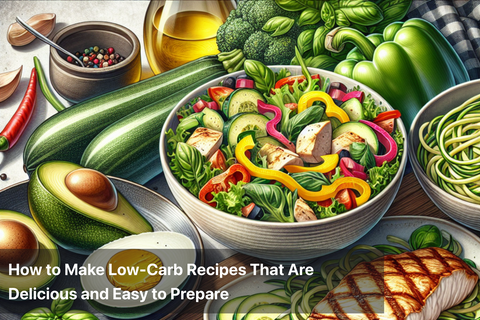
Low-Carb Diet for Athletes: Improving Performance and Recovery
Athletes traditionally rely on high-carbohydrate diets to fuel their performance, based on the belief that carbs are essential for endurance and strength. However, growing evidence supports the use of low-carb and ketogenic diets for athletic performance, especially in endurance sports and fat-adapted training programs. Transitioning to a low-carb lifestyle can enhance fat metabolism, stabilize energy levels, and reduce post-exercise inflammation, making it a viable option for athletes focused on performance and recovery.
Unlike the typical carb-heavy approach, a low-carb diet trains the body to use fat as its primary fuel source, a process known as fat adaptation. This metabolic shift can improve stamina and mental clarity while minimizing the reliance on constant carb refueling during long workouts or competitions.

How Carbohydrates Affect Athletic Performance
Carbohydrates provide quick energy, but they also lead to rapid spikes and crashes in blood glucose levels. This creates dependency on frequent carb intake, especially during endurance events. Athletes on high-carb diets often experience energy dips, digestive issues, or performance inconsistencies when glycogen stores are depleted.
In contrast, low-carb diets promote metabolic flexibility. Athletes can tap into their virtually unlimited fat reserves for sustained energy, reducing the need for frequent fueling. This leads to steadier energy levels, better focus, and improved recovery after workouts.
Causes of Performance Plateaus in High-Carb Athletes
|
Cause |
Explanation |
|---|---|
|
Blood sugar crashes |
Frequent highs and lows lead to energy dips |
|
Gut distress |
Excess carbs and sugars cause bloating or cramps |
|
Inflammation |
High-carb diets, especially refined carbs, increase oxidative stress |
|
Inconsistent energy |
Dependence on glycogen limits endurance |
|
Recovery delays |
Sugar and processed foods can impair muscle repair |
Symptoms Indicating Poor Diet-Performance Alignment
-
Early fatigue during workouts
-
Digestive discomfort while training
-
Cravings or energy crashes post-exercise
-
Slow recovery or persistent soreness
-
Brain fog during performance
-
Increased susceptibility to injury or illness
Benefits of a Low-Carb Diet for Athletes
-
Improved Fat Utilization
Fat becomes a primary fuel source during workouts, enhancing stamina and endurance without the need for constant carbohydrate intake. -
Reduced Inflammation
A low-carb diet, especially one rich in anti-inflammatory fats and vegetables, supports quicker recovery and reduces muscle soreness. -
Stable Energy Levels
Athletes experience fewer energy dips and more consistent performance throughout long training sessions or events. -
Mental Clarity and Focus
Ketones, produced during low-carb metabolism, are an efficient brain fuel that enhances concentration and decision-making during competition. -
Body Composition Improvements
Reduced carb intake often leads to fat loss and muscle retention, improving power-to-weight ratio and overall athletic performance.
Precautions for Athletes Adopting a Low-Carb Lifestyle
Transitioning from a high-carb to a low-carb diet requires careful planning and patience. The initial adaptation phase can cause temporary performance dips known as the "keto flu," characterized by fatigue, brain fog, and muscle cramps. These symptoms are normal as the body adjusts to burning fat for energy.
To ease the transition, athletes should:
-
Start gradually by lowering carb intake over 1–2 weeks
-
Stay hydrated and add electrolytes (sodium, potassium, magnesium)
-
Increase healthy fats to support energy needs
-
Prioritize sleep and recovery during the adaptation period
-
Listen to the body and adjust training intensity if needed
Low-Carb Foods to Support Athletic Performance
|
Food |
Benefits |
|---|---|
|
Eggs |
High in protein and essential fats |
|
Avocados |
Rich in potassium and healthy fats |
|
Fatty fish (salmon, mackerel) |
Anti-inflammatory omega-3s |
|
Leafy greens |
Provide magnesium and antioxidants |
|
Nuts and seeds |
Great for fuel and recovery |
|
Coconut oil/MCT oil |
Quick energy source from fats |
|
Greek yogurt (unsweetened) |
Protein-rich and gut-friendly |
|
Berries |
Low in carbs, high in antioxidants |
Nutrient Timing and Performance Tips
-
Train Low, Compete High (Optional Strategy): Some athletes train in a low-carb state to improve fat adaptation but use small carb loads before key races or events for performance bursts.
-
Fuel with Fats Before Workouts: A pre-workout meal of eggs, avocado, or a nut-based smoothie helps sustain long training sessions.
-
Post-Workout Recovery: Focus on protein and healthy fats to repair muscles. Add small amounts of carbs (like berries) if needed for glycogen replenishment.
-
Supplement Wisely: Consider magnesium, sodium, potassium, and omega-3s to support hydration and inflammation control.
-
Track Performance and Adjust: Monitor workout intensity, energy levels, and recovery to fine-tune your approach.
Common Mistakes to Avoid
-
Cutting carbs too fast without replacing calories with fat
-
Not consuming enough electrolytes during the adaptation period
-
Overtraining during the first few weeks of transition
-
Relying on processed low-carb foods instead of whole foods
-
Ignoring protein intake, which is essential for muscle maintenance

Who Can Benefit Most from a Low-Carb Approach
Low-carb diets are particularly useful for endurance athletes (runners, cyclists, swimmers), weight-class athletes (fighters, wrestlers), and those in sports requiring sustained mental focus (archery, shooting, eSports). It is also beneficial for athletes looking to maintain lean muscle mass while reducing body fat.
However, those involved in high-intensity explosive sports like sprinting or bodybuilding may need to strategically incorporate carbs around training windows to support glycogen-dependent performance.
Summary
A low-carb diet can offer significant performance and recovery advantages for athletes when implemented correctly. By shifting to fat as a primary fuel source, athletes benefit from more stable energy, reduced inflammation, improved body composition, and sharper mental focus. The transition may take time, but with proper hydration, balanced nutrition, and gradual adaptation, the body becomes more efficient and resilient.
Lofoods supports athletes in their low-carb journey with clean, performance-oriented foods that align with active lifestyles. Whether you're training for endurance, strength, or mental clarity, the right nutrition can elevate your game—naturally and sustainably.
This Blog post is an initiative by Lo! Foods, to provide accurate and Nutritionist / Doctor approved information related to Health. Lo! Foods is India's leading brand for Everyday Functional Foods. Foods designed for specific Health conditions or Needs. Lo! Foods also runs India's largest range of Low Carb Healthy Cloud Kitchens, under the brand names of Lo!, ProteinChef, ATH (All Things Healthy) and DiabeSmart.













Leave a comment
Your email address will not be published.